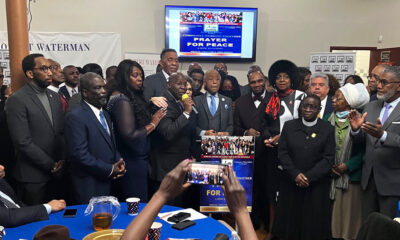City Politics
Cross-Endorsements Undergo Scrutiny As Elected Officials Become More Cautious
By Mary Alice Miller
Residents of New York State and New York City in particular have become accustomed to moderate Republicans over the years. But the toxic ideology of national conservative Republicans and their sharp shift to the Right is beginning to seep into New York. Recent events have exposed the inherent conflict of endorsements for Democratic candidates who also obtain ballot status on party lines that are antithetical to democratic principles.
“I will be far more critical when endorsing candidates who cater to other lines that in a lot of ways conflict with the principles of the Democratic Party and of my ideals as an American and where we want to go as a country,” said Assemblyman Walter Mosley. Alluding to the heightened distinction between the Democratic and Republican/Conservative parties and “where they want to take our country” Mosley said, “Clearly, to seek the endorsement of both parties tells me that you are not committed to either party and that whether you want to admit it or not your political views in some way or form are going to be questioned because of this conflict.”
Mosley’s conclusion? “In light of that — as a party elected official as well as a state legislator as part of the Democratic Party – going forward I will be highly critical of offering my endorsement and support of any candidate who seeks going down this path in lieu of what we have seen transpire and the abuse of this process in the current district attorney’s race.”
Cross-endorsements are not new. For decades, local Democratic candidates have taken the opportunity where possible to also run on a variety of other lines. (Judges are exempt from party pressure and have traditionally run on all three major party lines in general elections, an arrangement made among county leaders because judges are supposed to be nonpartisan.)
“I have always had a problem with people who are cross-endorsed by parties that are antithetical to democratic values,” said District Leader Chris Owens (52 AD). “The party that is most antithetical to democratic values is the Conservative Party. Across the board, they disagree with basically everything that Democrats do. With Republicans, it depends on the issue. With the Working Families Party, it depends on the issue.”
Owens said he would consider cross-endorsements. “I would consider it,” he said. “Whether or not it would happen, I don’t know.”
“I endorsed the Green Party candidate against the Democrat. I endorsed Gloria Mattera against Marty Markowitz in 2005. Why? Because Markowitz endorsed Bloomberg who is not a Democrat,” said Owens. “It is not secret that I have broken party lines before. I wasn’t district leader at the time. But as an individual, I endorsed Gloria because I felt the Borough President had done a disservice to the Democratic nominee.”
Owens gave the anti-birth control Right-to-Life Party as an example of a party antithetical to democratic principles because women have a right to their bodily autonomy.
“I would consider not endorsing a Democrat who is also running on the Right-to-Life party. That’s me,” said Owens. “But there are Democrats who vote very democratic in Southern Brooklyn or even in Caribbean sections of Brooklyn who would not have a problem with somebody also running on Right-to-Life.”
Endorsements are both individual and group decisions. Cross-endorsement decisions usually occur as a closed-door decision unless a candidate openly decides to circulate petitions for another additional party line and then files a Wilson-Pakula application to get permission from the county leader (or three county leaders if it is citywide office) of that party to be allowed to run on that line. Anybody can petition but may not be allowed on the line if they do not get the Wilson-Pakula.
“That’s what the whole controversy with Malcolm Smith was about,” said Owens, referring to when Republicans in Queens, along with Dan Halloran and Malcolm Smith, were “engaged in the business of essentially selling the line… regardless of whether you are a Republican or not.”








